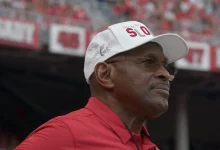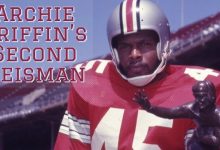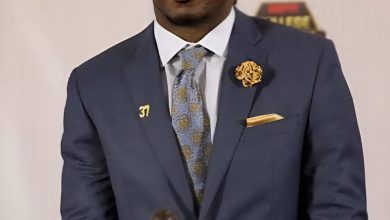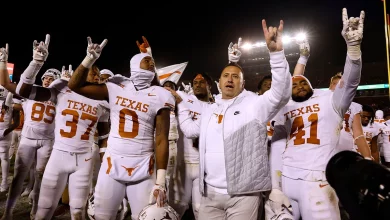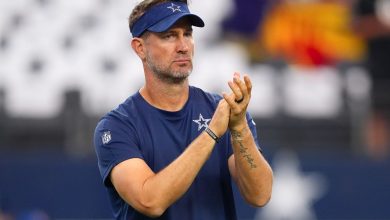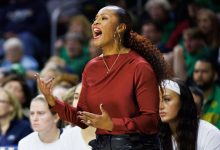The Baltimore Ravens made history with what is believed to be the NFL’s first all-Black quarterback room. Lamar Jackson, Tyler Huntley, Josh Johnson, assistant coach Kerry Dixon, and quarterbacks coach Tee Martin stood together in a powerful moment that broke barriers in a league that once refused to give Black players and coaches a chance at leading positions.
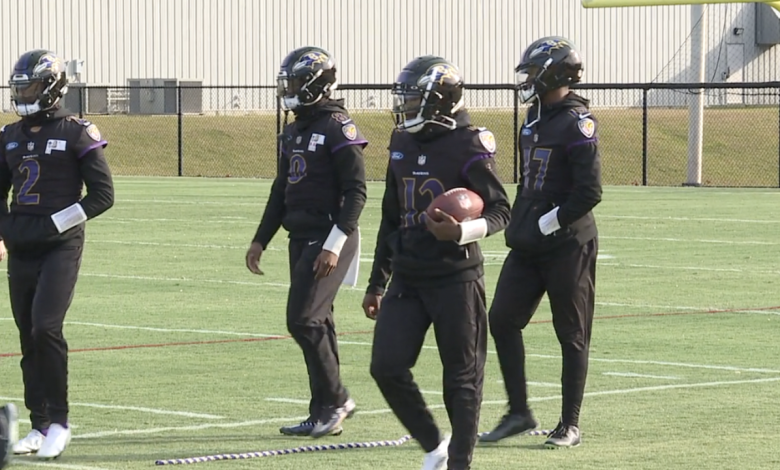
In a monumental moment that is resonating across the NFL and beyond, the Baltimore Ravens have made history with what is believed to be the league’s first all-Black quarterback room. This groundbreaking achievement includes Lamar Jackson, the reigning MVP and franchise quarterback; Tyler Huntley, his backup and a rising star in his own right; Josh Johnson, a veteran signal-caller; and two key figures in coaching: Kerry Dixon, the team’s assistant quarterback coach, and Tee Martin, the Ravens’ quarterbacks coach.
The sight of all five individuals—each contributing in their own right to the Ravens’ future—standing together in a unified moment symbolizes a significant shift in the NFL’s culture. It is a reminder of how far the league has come from its past, when Black players, especially quarterbacks, were not given the opportunities to lead teams or break through into coaching roles.
This historic occasion marks not just a victory for the Ravens, but also a turning point in the fight for diversity, representation, and equality within the NFL. At a time when the league is increasingly reflecting on its past treatment of minority players and coaches, this moment stands as a beacon of progress and hope for future generations.
For decades, the NFL has been dominated by a predominantly white leadership hierarchy, with quarterbacks traditionally being considered the “face of the franchise.” It was not until relatively recently that Black quarterbacks began to be recognized as capable leaders of teams, a battle fought by pioneers like Doug Williams, Warren Moon, Randall Cunningham, and Steve McNair, to name a few. Even in today’s game, while Black quarterbacks are becoming more common, they are still often seen as exceptions rather than the norm.
The history of Black quarterbacks in the NFL is laden with challenges and barriers. Historically, Black players were often pigeonholed into positions like running back or wide receiver, while the quarterback position was dominated by white players. Black quarterbacks had to fight not only for their spots on rosters but also against systemic biases, stereotypes, and the perception that they weren’t “intelligent” enough to run an offense or lead a team.
Fast forward to today, and the game has evolved, with stars like Patrick Mahomes, Russell Wilson, Kyler Murray, and Jalen Hurts showing that Black quarterbacks can lead teams to championships and MVP-level performances. The Ravens’ quarterback room, now comprised entirely of Black quarterbacks and coaches, is an embodiment of this shift.
For Lamar Jackson, in particular, this moment carries additional significance. Jackson’s rise from being viewed as a project quarterback—due to his unique playing style and skill set—into an MVP winner, Super Bowl contender, and face of the Ravens franchise is a story that challenges long-held misconceptions about Black quarterbacks in the NFL. Jackson’s success, combined with the Ravens’ commitment to surrounding him with a supportive, diverse coaching staff, has provided a platform for change within the organization and the league at large
Lamar Jackson, drafted by the Ravens in the first round of the 2018 NFL Draft, is the centerpiece of this historic moment. His journey has been both a testament to his talent and resilience as well as a reflection of the barriers that Black quarterbacks have faced over the years. Jackson, who won the NFL MVP award in 2019 after leading the Ravens to a 14-2 record and setting multiple single-season records, has not only redefined what it means to be a quarterback but also broken through entrenched stereotypes about his abilities.
When Jackson entered the NFL, critics doubted his style of play. As a dual-threat quarterback with exceptional running ability, he was often compared to other quarterbacks of color like Michael Vick—who had also faced skepticism for being “too athletic” and “not traditional enough.” However, Jackson’s play on the field—marked by his poise, vision, and leadership—quickly shut down those criticisms. His success proved that Black quarterbacks could not only thrive but excel in a role that had been historically dominated by white players.
For Jackson, being part of an all-Black quarterback room is an inspiring and full-circle moment. “When I came into this league, there were still people questioning whether a Black quarterback could lead a team. Now, to be in this situation with Tyler, Josh, Tee, and Kerry, it’s a huge honor,” Jackson said. “We’ve broken barriers, and this is just another step in the right direction.”
Tyler Huntley, a former undrafted free agent, has become a crucial part of the Ravens’ quarterback depth chart. Huntley’s role as Lamar Jackson’s backup quarterback has often been overlooked by casual fans, but his contributions have been significant. When Jackson was sidelined with an injury in the 2021 season, Huntley stepped in admirably, showcasing his own potential as a capable starting quarterback in the NFL.
Huntley’s success has made him a strong case for the NFL’s increasing diversity at the quarterback position. Huntley, who is often lauded for his poise and understanding of the game, has become a key player in the Ravens’ future and a symbol of how talent at quarterback is no longer limited by race.
Huntley has spoken about the importance of representation, noting how seeing Black quarterbacks thrive in the league helps inspire future generations. “I think it’s important for kids who look like me to see guys in this position. It shows them that they can be the future of this league too, no matter where they come from,” Huntley said in a recent interview. “Lamar, Josh, and I, we’ve all had to overcome our own struggles to get here, and it’s important to remember that we’re breaking barriers, not just for ourselves, but for the next generation.”
Josh Johnson, a well-traveled quarterback who has played for nearly a dozen NFL teams, has carved out a unique niche in the league as a valuable veteran presence. Johnson’s journey through the NFL has been anything but conventional, and his ability to continually find opportunities with various teams speaks to his skill and perseverance.
In the context of the Ravens’ quarterback room, Johnson serves as a mentor for the younger quarterbacks, offering invaluable advice and leadership. Despite being a relative newcomer to the Ravens’ organization, Johnson’s experience and knowledge of the game have made him a key figure in fostering a collaborative and supportive environment among the quarterbacks.
For Johnson, the significance of being part of the first all-Black quarterback room is not lost on him. “I’ve been in the league a long time, and I’ve seen things change, but to be part of this history is truly special,” Johnson said. “It’s a testament to how far we’ve come, but it’s also a reminder that the work isn’t done. We still have a long way to go to see more Black coaches, more Black quarterbacks, and more Black leaders in this game.”
The presence of Tee Martin and Kerry Dixon in this all-Black quarterback room is just as significant as the players themselves. Martin, the Ravens’ quarterbacks coach, and Dixon, the assistant quarterbacks coach, have both been instrumental in shaping the careers of Jackson, Huntley, and Johnson. Their leadership not only enhances the development of the team’s quarterbacks but also represents a critical step in diversifying the coaching ranks within the NFL.
Tee Martin made history himself as the first Black quarterback to win a national championship as a starting quarterback at the University of Tennessee, and his move into coaching has brought new perspectives and a deep understanding of the game. Martin’s work with the Ravens quarterbacks has been widely praised, as he has helped Jackson and others develop into more polished and dynamic players.
Kerry Dixon, another veteran of the coaching world, has also been a critical figure in shaping the Ravens’ quarterback room. Dixon’s experience and ability to connect with players have made him a respected figure in the NFL. Together, Martin and Dixon represent the growing number of Black coaches who are helping to break down barriers and establish themselves as critical voices in the coaching community.
For Martin, this milestone moment is both personal and professional. “It’s important to show young players that they can achieve anything in this game, no matter their background or the color of their skin. Representation matters, and seeing Black quarterbacks and coaches in these positions is just the beginning.”
The Ravens’ all-Black quarterback room is a watershed moment for the NFL, one that will have lasting implications for both the league and future generations of players. While it is just one small step in a much larger movement, it represents a profound change in an institution that has long been resistant to progress in terms of diversity and inclusion.
This moment will inspire countless young athletes who may have previously felt discouraged by the lack of representation at the quarterback position. For Black quarterbacks and coaches, this breakthrough signifies that the door is open, and it is no longer as difficult to break through the glass ceiling that has held so many back for generations.
The Ravens’ decision to create a supportive environment that fosters both player and coaching diversity speaks volumes about the direction the league is heading. It shows that the NFL is increasingly recognizing the value of a diverse perspective, whether on the field or from the sidelines. This historical moment also highlights the contributions of trailblazers like Doug Williams, Warren Moon, and others, who paved the way for the players and coaches that followed.
In the end, the Ravens’ all-Black quarterback room is not just about breaking barriers—it’s about changing the narrative for good. It’s a powerful statement to the NFL, its fans, and the world that Black quarterbacks and coaches have every right to lead teams and make history. The Baltimore Ravens have proven that the future of the NFL is more diverse, more inclusive, and, ultimately, stronger because of it.

